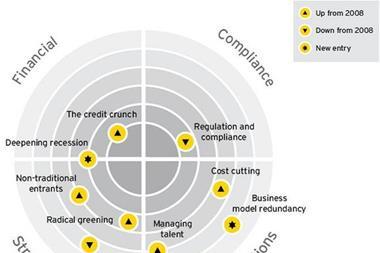For risk management to work it needs to be focused strategically and not ignored as a back office function, say the authors of Global Risks 2009
The financial crisis has underlined the need for better risk governance not just risk management, according to the authors of the World Economic Forum’s ‘Global Risks 2009’ report.
For risk management to work it needs to be focused strategically and not siloed as a compliance function, said John Drzik, chief executive officer of Oliver Wyman.
Risk governance means asking the right questions about risk and putting in place mechanisms to inform senior management if the risks a company is taking are not aligned with its risk appetite. ‘That was not done well in financial services,’ said Drzik.
One lesson from the financial crisis is that companies need to focus on the extreme risks that can ‘kill’ it, he said. Specific ‘Black Swan’ committees have been set up in some firms, he noted.
Problems with concentrations of exposure in supply chains also indicate the need for better risk governance outside the financial sector. Supplies of pandemic flu vaccines are too highly concentrated, noted Drzik. Public authorities need to diversify their sources of supply, he said.
“The financial crisis has also shown that risk models have limitations
The financial crisis has also shown that risk models have limitations. Many companies were over reliant on risk models and were not able to spot existential risks, said Drzik.
He also warned of the danger of short-termism and under investment in risk management infrastructure.
Other risks highlighted by the report were fiscal crises, a sudden drop in China’s growth and further falls in asset prices.
See also: Chinas hard landing a big risk


















No comments yet